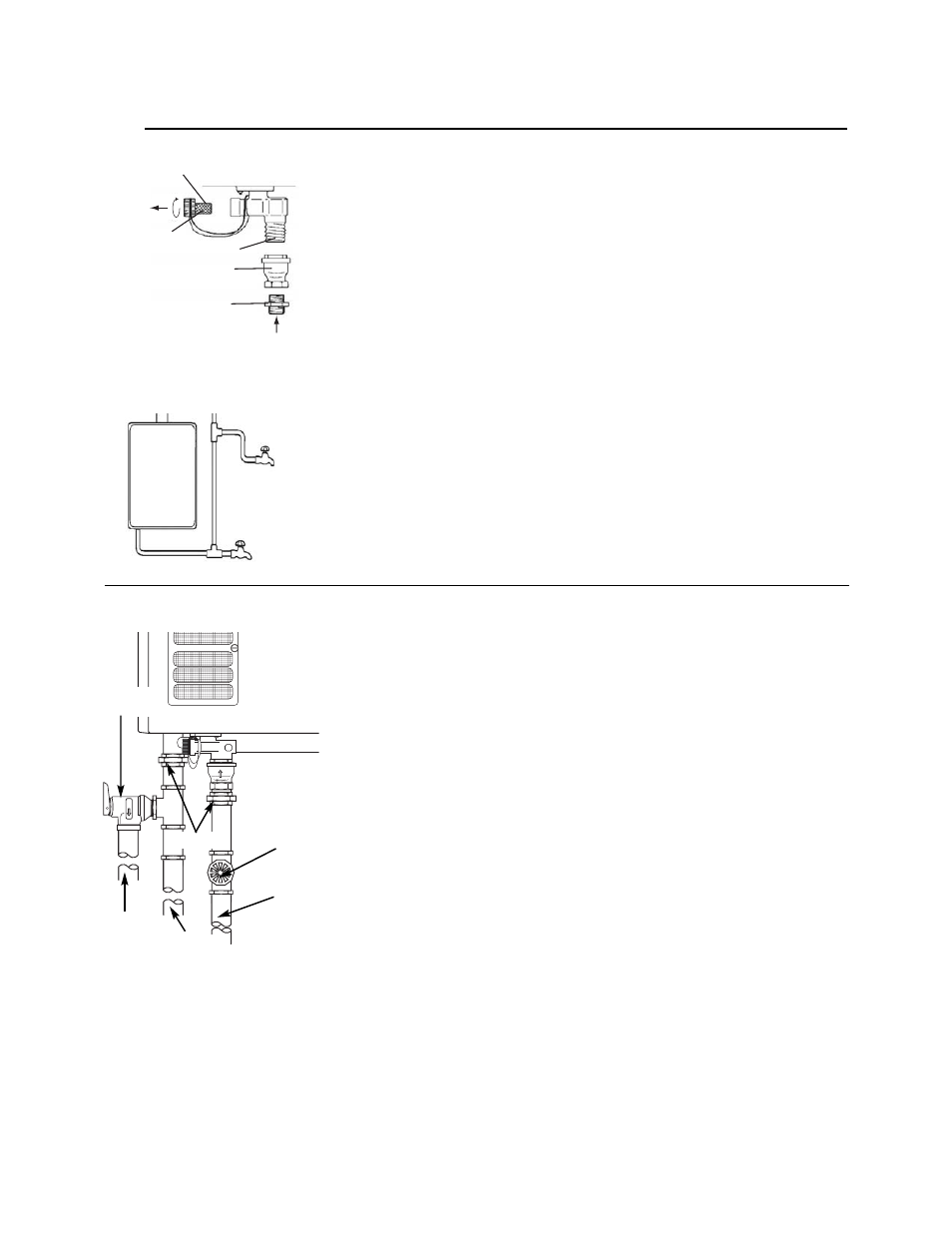Installing the water heater, Relief valve, Water supply connections continued – Paloma PH-28c Indoor and Outdoor User Manual
Page 11

Installing the water heater:
Relief Valve
A new pressure relief valve, complying
with the Standard for Relief Valves and
Automatic Gas Shut-Off Devices for Hot
Water Supply Systems, ANSI Z21.22/
CSA 4.4, must be installed at the hot
water outlet connection of the water
heater at the time of installation. Local
codes shall govern the installation of
relief valves.
For safe operation of the water heater, be
sure that:
●
The pressure rating of the relief valve
must not exceed 150 psi (1034 kPa), the
maximum working pressure of the
water heater as marked on the rating
plate.
●
The BTUH rating of the relief valve
must equal or exceed the BTUH input
of the water heater as marked on its
rating plate.
●
No valve of any type should be
installed between the relief valve and
the water heater
●
Discharge from the relief valve should
be piped to a suitable drain to eliminate
potential water damage. Piping used
should be of a type approved for the
distribution of hot water.
●
Hot and cold water lines should be
insulated up to the water heater. Refer
to page 24 for details.
●
The discharge line must be NO
SMALLER than the outlet of the relief
valve and must pitch downward to
allow complete drainage (by gravity) of
the relief valve and discharge line.
●
The end of the discharge line should not
be threaded or concealed and should be
protected from freezing. No valve of
any type, restriction or reducer coupling
should be installed in the discharge line.
Notice: Local codes govern the
installation of relief valves. If local codes
require that a temperature and pressure
relief valve should be installed the
manufacturer recommends a type 40XL
Watts T&P relief valve or an equivalent
model be used.
Notice: Manual operation of relief valves
should be performed at least once a year.
Turn off the electrical power and gas
shutoff valve. Lift and release lever on the
relief valve and check the manual
operation of the relief valve. You should
take precaution to avoid contact with the
hot water coming out of the relief valve
and to prevent water damage.
Notice: If the relief valve on the system
discharges periodically, a problem exists
and service to the water system is
required.
Water Supply Connections Continued
Install a shutoff valve near the inlet of the
water heater for service and draining
purposes.
It is not recommended to use pipes with
smaller diameters than the water supply
connection of the water heater.
Before connecting the water supply pipe
to the water heater, open the shutoff valve
and clean out sand, debris, air, caulking
material, etc. inside the pipe. Connect to
the water inlet, then check water flow.
Close the shutoff valve and clean the
water filter.
Be sure to connect the water inlet and the
hot water outlet as shown on the water
heater. If reversed, the water heater will
not function.
Installation of unions or flexible copper
connections are recommended on the
HOT and COLD water lines, so that the
water heater may disconnect easily for
servicing if necessary.
Install a Check Valve between the water
heater and the water shutoff valve. (See
illustration the top left).
The following should be addressed in
regards to the HOT WATER OUTLET:
●
Connections between the water heater
and point(s) of use should be as short
and direct as possible.
●
DO NOT use lead or plastic pipe.
●
To conserve energy and minimize heat
loss, insulation of hot water piping is
recommended. (See Hot and Cold Pipe
Insulation Installation on page 24).
Notice: The flow rate of hot water may
vary when more than two faucets
(appliances, fixtures, etc.) are being used
simultaneously.
Notice: The pipes MUST be completely
drainable. If the hot water faucets are
located at a point higher than the water
heater, place a drain valve at the lowest
point (see diagram to the left).
Water Filter
Check Valve
Water Inlet
Clean the
Water Filter
Water
Nipple
Air
Relief
Valve
Hot
Water
Tap
Drain Valve
Union
Pressure
Relief Valve
Water
Shutoff
Valve
Cold
Water
Supply
Inlet
Hot Water
Supply
Outlet
Relief
Valve
Discharge
Line
Notice: The above illustrates a
pressure only relief valve. If local
codes require a combination
temperature and pressure relief
valve be installed, an extension
piece may be needed. (Refer to
page 22 or 23 for example of
extension piece for T&P relief
valve installation.) The T&P relief
valve probe should not be directly
in the flow path of the water.
Notice: Use only teflon tape on cold
and hot water connections and
lines.
11